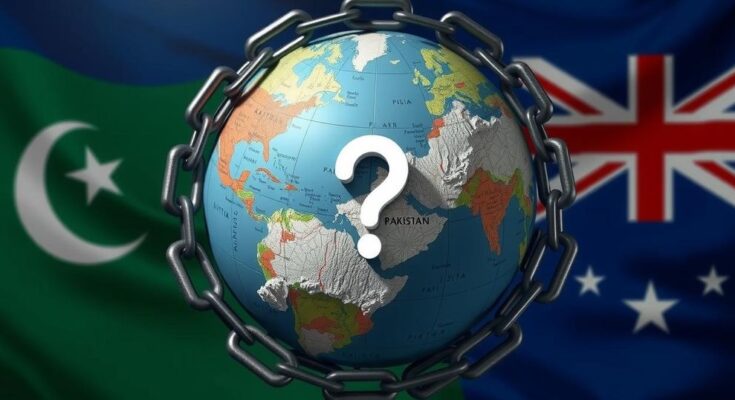Pakistan faces intensified global scrutiny for severe human rights abuses with calls for its suspension from the Commonwealth. Reports cite state suppression against activists, misuse of blasphemy laws, and violence against religious minorities. Prominent figures, including Malala Yousafzai and Imran Khan, highlight the crisis. These developments invoke demands for reform and accountability through stronger international intervention.
Pakistan finds itself in the international spotlight amid increasing concerns over rampant human rights violations. The government’s suppression of free expression, misuse of blasphemy laws, and the targeting of political figures, including former Prime Minister Imran Khan, paint a dire picture of the nation’s human rights climate. Organizations like Amnesty International and Human Rights Watch have condemned the situation as out of control, echoing the sentiments of activists and prominent figures like Malala Yousafzai. The nation’s deteriorating human rights situation is highlighted by numerous cases of state repression against journalists, activists, and marginalized groups such as the Pashtun Tahafuz Movement (PTM) and Baloch rights defenders like Dr. Mahrang Baloch. The Pakistani authorities’ actions have fostered a pervasive atmosphere of fear and violence, leading to severe consequences for those advocating for change. The alarming deaths linked to blasphemy accusations illustrate the devastating impact of these discriminatory laws on religious minorities and dissidents alike. The Commonwealth, which upholds democratic values and human rights as part of its charter, is now under pressure to reconsider Pakistan’s membership due to its ongoing violations. An open letter from various human rights organizations calls for Pakistan’s suspension, asserting that continued membership undermines the Commonwealth’s credibility in promoting human rights globally. Activists believe this could catalyze much-needed reforms within the country, particularly involving its oppressive blasphemy laws. However, many question whether suspension from the Commonwealth would genuinely prompt Pakistan to amend its policy failures. Previous suspensions in 1999 and 2007 led to some reforms, suggesting potential effectiveness. The symbolic and economic impacts of such a decision might compel the government to reconsider its stance on critical issues, especially considering Pakistan’s reliance on international partnerships. As the struggle for human rights intensifies, the persecution of political figures like Imran Khan exemplifies the regime’s growing authoritarianism, marking a troubling trend. His movement, once a symbol of change, now faces systematic repression as dissent continues to be silenced amid rising violence against critics and minorities. The urgency for international intervention remains pressing, with the plight of activists and oppressed groups calling for global attention and action.
Pakistan’s human rights crisis has worsened, characterized by pervasive violations including the use of blasphemy laws and suppression of freedom of speech. Prominent figures like Imran Khan, along with marginalized movements, face state repression as the government increasingly stifles dissent. The international community, alarmed by these developments, is contemplating mechanisms like suspension from organizations such as the Commonwealth to compel reform and uphold human rights standards.
Pakistan’s growing human rights crisis necessitates immediate international attention and action. The calls for its suspension from the Commonwealth signal widespread frustration against the government’s failure to safeguard its citizens. This potential move could catalyze vital reforms, particularly regarding blasphemy laws and the treatment of marginalized communities, representing a vital step toward achieving accountability and justice in Pakistan.
Original Source: www.jurist.org



